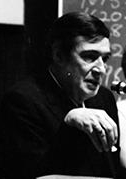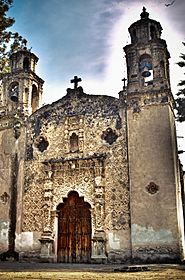Salvador Novo facts for kids
Salvador Novo López (born July 30, 1904 – died January 13, 1974) was a famous Mexican writer, poet, and many other things! He was also a playwright (someone who writes plays), a translator, and even a TV presenter. He was the official historian (called a "chronicler") of Mexico City. Salvador Novo was a very smart person who helped shape how people thought about politics, media, art, and Mexican society in general. He was part of a group of Mexican writers called Los Contemporáneos and also a member of the Mexican Academy of the Language.
Contents
Life and Career of Salvador Novo
Salvador Novo was well-regarded by the Mexican government. He worked in cultural roles for the government, became part of the Mexican Language Academy, and even had a television program about Mexico City's past.
Towards the end of his life, he was known for his unique style. He often dyed his hair a bright carrot color and wore many fancy rings and colorful suits. Some people compared him to the famous writer Oscar Wilde. However, unlike Wilde, Salvador Novo was always accepted and respected by society and the government throughout his life.
He was also very well known for his quick and clever humor. Once, when a party had some trouble, Salvador Novo calmly said, "This is what happens when members of the intellectual elite try to enter military circles." This showed his witty way of looking at things.
Following a tradition, the street where he lived was renamed after him when he became Mexico City's official historian. This was a job he held for the rest of his life.
Tributes to Salvador Novo
On July 30, 2014, Google honored Salvador Novo with a special Doodle on their homepage. This was to celebrate what would have been his 110th birthday.
Works by Salvador Novo
Salvador Novo wrote many books, including poetry and other types of writing. Here are some of his well-known works:
- 1925 – XX Poemas (XX Poems)
- 1933 – Nuevo amor (New Love)
- 1933 – Espejo (Mirror)
- 1934 – Seamen Rhymes
- 1934 – Romance de Angelillo y Adela (Romance of Angelillo and Adela)
- 1934 – Poemas proletarios (Proletarian Poems)
- 1934 – Never ever
- 1937 – Un poema (A Poem)
- 1938 – Poesías escogidas (Chosen Poems)
- 1944 – Nuestra tierra (Our Land)
- 1945 – Florido laude
- 1945 – La estatua de sal (The Salt Statue, published in May 2008)
- 1955 – Dieciocho sonetos (Eighteen Sonnets)
- 1955 – Sátira, el libro ca... (Satyre, the F*** Book)
- 1961 – Poesía (Poetry)
- 1962 – Breve historia de Coyoacán (Short History of Coyoacán)
- 1967 – Historia gastronómica de la Ciudad de México (Gastronomic History of Mexico City)
- 1967 – Imagen de una ciudad (Image of a City) illustrated with photographs by Pedro Bayona
- 1968 – La Ciudad de México en 1867 (Mexico City in 1867)
- 1971 – Historia y leyenda de Coyoacán (History and Legend of Coyoacán)
Salvador Novo's Theatre Works
In 1950, Salvador Novo bought a large piece of land and, with the help of architect Alejandro Prieto, decided to create a cultural center called "La Capilla." He turned an old chapel into a theatre, which opened on January 22, 1953. Today, this place also has a small restaurant called "El Refectorio" and a theatre-bar called "El Hábito."
Here are some of the plays Salvador Novo wrote:
- Don Quijote (1947)
- Astucia (Witness) (1948)
- La culta dama (1948) (The Wise Lady; this play was used to create the script for a Mexican film in 1957)
- A ocho columnas (Eight Columns) (from 1953 onwards)
- Diálogos (Dialogues)
- Yocasta o casi (Yocasta or Almost)
- Cuauhtémoc (Cuauhtémoc)
- La guerra de las gordas (The War of the Fat Ones)
- Ha vuelto Ulises (Ulises is back)
- El sofá (The Sofa)
- El espejo encantado (The Enchanted Mirror)
See also
 In Spanish: Salvador Novo para niños
In Spanish: Salvador Novo para niños
 | Precious Adams |
 | Lauren Anderson |
 | Janet Collins |



